Athens Remembers Carl Lindberg

Carl Lindberg in 2014.
When Flagpole learned that jazz bassist Carl Lindberg, who played with Grogus, Old Skool Trio and other Athens bands, had passed away May 15, we asked members of the Athens music community to pay tribute. Here’s how they remember Lindberg:
Dan Nettles: I’m sorry I have kept so quiet about my brother Carl leaving us. I’m hiding out, and keeping still and quiet. Powerless and waiting.
Thank God for music. There aren’t a lot of words that even come close to capturing anything I can say, but if I tried, I’d have to say I lost my first brother Casey to suicide in high school, and found my second brother, Carl, right around that time. I watched him rock some Led Zeppelin tunes in someone’s living room. We weren’t close then. We lived high-schools apart, and I had no idea who he would be to me. Then college swept me away.
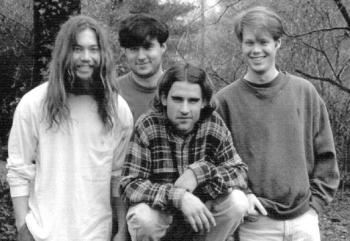
Squat in 1996.
Post-college, there were hundreds of gigs: losing hearing every Monday night playing at the City Bar, or Tuesday at the Winery. My first-ever studio session was with Carl and Jeff Reilly. Crazy. We became closer, and he helped me heal my broken heart, once, twice, three times. We met at Little Italy and played Area 51 for consolation. He put up with me as I dabbled in Tai Chi and Baugua, looking for something. We kayaked down the Oconee River, we played Settlers of Catan, we made fires and howled at the moon. Our dogs Amos and Mickey were best friends, too. We made records together; we made records apart; we knew each others’ songs and played them back for each other.
Carl was tireless, and tired, and one person for the many, and another quiet, caring person when we got to be alone. When he was on, it was the greatest to play music with him. He never seemed to know how good he was as a teacher, a leader, a musician, a father and a lover of life.
In music and in life, he was his own worst enemy. If he could see himself even a fraction of how we see him, how wonderful and great he was, he would still be here. But, as I know from my own experiences, depression makes you blind. It hides all the good things in your life and blankets you in loneliness and pain.
I have regrets. During the last few rocky months in my life, I often thought, “Ah, well, at least I get to teach camp all summer with Carl!” It lifted me up to know I would get to spend hours and hours with him. This will never be, and it tears me to pieces.
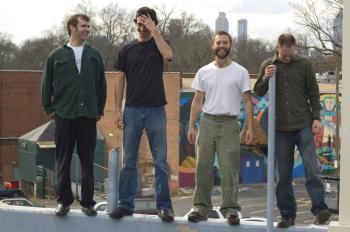
Squat in 2009.
Carl, he is gone now. He’s gone to a better place. The pain is over for him. We keep what we can. I keep his voice. I hear him all the time, saying things he’d say, singing things he’d sing. It’s going to take a long, long time, and things will never be the same again. In every show in every set there will be a song that is for you, Carl.
I’m sorry I didn’t give him more. We had made a promise to call each other if things got too bad. And I’m sorry he couldn’t call me, but I understand the pain. I'm left now trying to understand what this world without him will be like. I'm trying, and I'll be trying for a long time. He would be the person I’d call right now to help me heal my shattered heart.
I love all of you. Hold each other close.
Betsy Franck: I first met Carl at Jittery Joe’s in Five Points, when it was in the corner gas station building where Athens Running Company now resides.
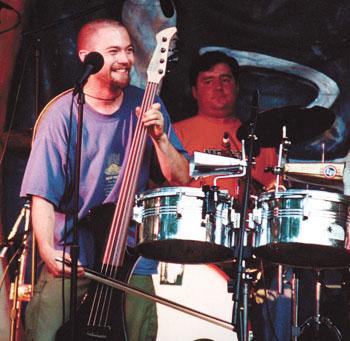
Carl in 2002.
I was new to town and serving up espresso shots to what would become my tribe. Carl walked in with his infectious smile and intense gaze, holding a flyer he had hand-written for a show he was playing at Seney-Stovall Chapel. He had just come home from China, and we spoke at length about his travels and his return to town with renewed inspiration and excitement. We connected on a deep level with one interaction, as I know now he did with many. He had a way of making you feel like the most important person in the world.
We grew closer through the years, sharing the stage, sharing laughter, tears, admiration, constructive criticisms. I can remember so many things that he taught me that range from music advice to how to breathe your way into being a better parent. I love that man from the tips of my toes to the ends of the universe and really can't imagine who I would be if I didn't have the Carl-isms I have in my mind that I will carry with me for the rest of my life.
Trey Wright: I first met Carl while taking a jazz improvisation course at UGA taught by Steve Dancz in the early 1990s. Carl was a bright-eyed young bassist ready to take on the world, and I was a shy, naive guitarist who was trying to figure out who he was. We starting meeting outside of class to practice and to sneak into the Half Moon Pub to see Thunder Wamper shows. (We were both underage at the time.)
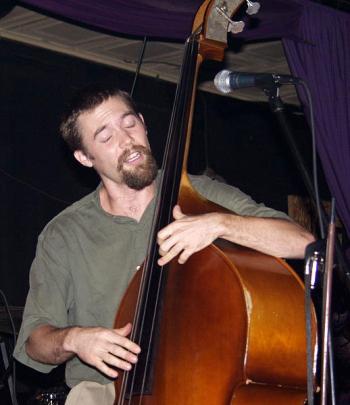
Carl in 2012.
The roots of the band Squat were formed in that class. It is often said that being in a band is like being in a family. Our fun-loving, dysfunctional family hit the road in the mid-1990s and experienced life together. I am thankful for those experiences—those moments of insanity on the road were unlike anything I will experience again, and they truly shaped who I am today.
I don’t know how any of us will make sense of what has happened, and I’m pretty sure we never will. I do know this: Carl made an enormous impact on everyone he met with his bear hugs, his smiles, his words of wisdom and his soulful music.
Carl and I often spoke of an “attitude of gratitude.” Here is what I’ve got. Without Carl:
- I would not be a musician.
- I would have no idea what it’s like to live out of a van.
- I would have always played too many notes.
- I would have never understood clave.
- I would have never developed the confidence to write music.
- I would have no idea what permaculture is .
- I would have never read Rumi .
- I would have never met the Dalai Lama.
- I wouldn’t have blueberry bushes in my front yard (or the Lemon Balm).
- I would have never developed an appreciation for S\sriracha.
- I would have never heard of Tai Chi (until it became trendy about 10 years ago).
- Along with Tommy, I would have never figured out that music can be art and entertainment, and can be absurdly wacky at the same time (with the occasional political message thrown in for good measure).
- I would have never worn a dress at the Georgia Theatre (maybe I could have done without this part).
In short, without Carl, I would have never known what it means to have a brother. We miss you, boogerman.
Steve Dancz: There are times in life when silence really feels like the best thing, and this seems like one of those times. Counterintuitively, and sooner than I'm able, I'm going to attempt to express in words what Carl Lindberg meant to me. Know that I don't have high hopes of success as the convulsions of grief continue.
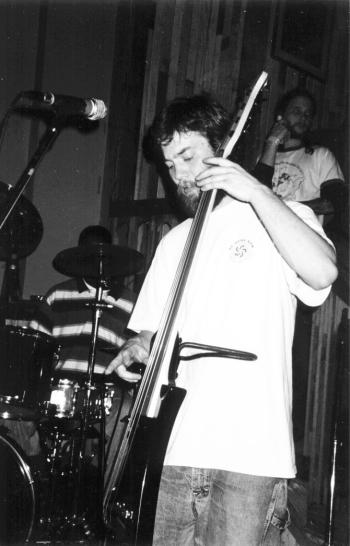
Carl in 1998.
I met Carl when he called me, asking to study. He was a 16- or 17-year-old, still in high school, eager to take his music to the next level. There was a seriousness there, a groundedness, a presence about him. That palpable presence remained during all the years that I knew him, until he left us last week, shortly after his 40th birthday. Over the years, he became a master musician. During his time at UGA, he studied improvisation and played in the big band, and more importantly, had the opportunity to meet other musicians, including Trey Wright, Dwayne Holloway, Tommy Sommerville and Kevin Hyde, to name just a few—beautiful creatives that would be so important in his life going forward.
One of the many gifts of being a teacher is witnessing deep talent at its nascent stage. Carl's was obvious, and early on he and I started making music together. I loved having him part of the music I was making. We performed for years once a week at Walt Light's Churchill's in a band that included Roger Dancz, Dwayne Holloway and John Lewis. When Roger passed away in 1998, we continued our residency with Dub Hudson.
When the Dalai Lama's invitation came in 2000 to play the First World Festival of Sacred Music in Bangalore, the band I put together was made up of Carl, Trey and Dwayne. The students and the teacher had become fellow bandmates, and the trip to India was a journey of indescribable joy. We played a few original tunes, but the majority of our set came from African-American spirituals, and if you knew him, you can likely imagine Carl's performance on that stage. The house was rocking, with no one left out—Tibetan monks, Rajasthani mystics and Mongolian shamans were all on their feet clapping.
That was Carl in his musical element. His love and generosity of spirit literally enveloped whatever performance space we inhabited. These last years we have performed at the High Museum in Atlanta with the same result, and my favorite music to play this last year has been with Grogus.
It's odd… I began playing gigs when I was still in high school, and from the age of 19–24, I often performed seven nights a week for months at a time. Following that period, I felt somewhat finished with playing out and turned my attention to the studio and composing, severely cutting back the schedule of live performances. That bit of history is important here, because for the last several decades, Carl Lindberg has been one of the primary reasons that I performed in public at all. I so loved making music with him. That part was critical, but beyond that, it was also that I loved being with him. I feel fortunate that we were together in this life. His presence, his humor and his humanity shone so brilliantly on- and offstage, and there is a reason why Carl has been a involved in virtually every performance I have been a part of for two decades.
So many joyous conversations began like this:
"Hey, Big Boss!"
"Whassup, Little Boss?"
I hope I never forget the sound of that beautiful, joyous voice—the sound that always made me happy to have picked up the phone.
For many years, we experienced momentous life changes together, including going through the deaths of our fathers, both of whom were larger-than-life figures. I've thought about this so much over these last difficult days, trying to describe what our relationship was to friends that didn't know him. So far, I can't. He called me his mentor, and that is true. Saying he was like a son to me isn't completely accurate, although there were times when it did feel like that. These last years he has often more like a brother.
What I can say is that our relationship was complex, long-lasting, multi-leveled and ever-changing. He sought me out in his mid-teens, and left me as a 40-year-old man with a child of his own. We were 18 years distant, chronologically, but in parts of our relationship there was truly no time, no space and no distance. For those of you put off by the cosmic language, I apologize—there is simply no other way to say it.
Carl and I were soul partners. Tied at the heart, we were linked deeply on our path together on this earth. Life by life, our gender changes, talents change, our outer circumstances change, but we always recognize love. The Tibetans have a saying: "You always find your family, no matter where they are." One family member is gone, and I'm deeply feeling the loss.
Rick Williams: Sitting here in a coffee shop in the East Village, and I’m struggling to type. Because it just makes all this more real, and none of us want it to be. But we all have a debt to repay to Carl Lindberg. He gave us everything he had and more. This cat didn’t hold back. He freed us. He made Athens Athens.
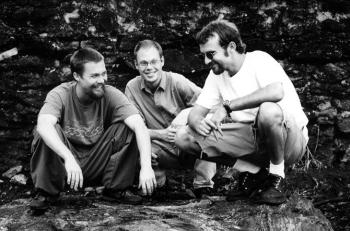
Squat in 2012.
Carl was a musical, a spiritual, a universal sponge. He made us believe. If any of us was having an existential moment, all it took was one big hug, one song, one chest-beating, foot-stomping, smiling, dancing, hands-raised-to-the-sky plea, and we knew again that deep in the marrow of the world was goodness. What lucky souls we are to have walked the same Earth as Carl Lindberg.
He was the very first musician I ever saw perform in Athens, and in the 10 years that followed living there, and in the 10 years since, I don’t think anyone has ever moved me, handed me that gut-punch, lit the way, given me—and all of us—permission to feel. Don’t know how else to phrase it. Whether you were next to him on stage, in the crowd, working the bar, taking his picture or just passing by, it’s like he was called by a higher power to give the hairs on the backs of our necks a lot of exercise.
Carl ain’t gone. No way. At the top of every note, every time we find the pocket, every time we muster the courage to sing a little louder, to slink out of our comfort zone, every time we take a chance on ourselves, and the magic of Athens (no matter where we are) lets itself be known once again, Carl’s right there. We owe him a debt, guys. And the only way to settle it is to pay it forward.
Be kinder. Be braver. Channel goodness. And when the time is right, don’t be afraid to get funky. Much love to Carl’s sweet family and everyone who called him brother. Thank you, Carl.












comments